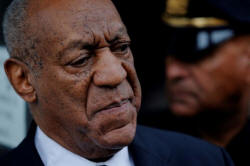|
 Cosby
deadlock makes task of finding second jury even more
difficult Cosby
deadlock makes task of finding second jury even more
difficult
 Send a link to a friend
Send a link to a friend
[June 20, 2017]
By Joseph Ax
NEW
YORK (Reuters) - Now that Bill Cosby's first sex assault
trial has ended in deadlock, the difficulty of seating
an unbiased jury for the famed entertainer's retrial may
have ratcheted higher, thanks to blanket media coverage
of the sensational case, legal experts say.
|
|
 Montgomery County Court of
Common Pleas Judge Steven O'Neill has kept secret the names of
the 12 jurors who spent 52 hours in an unsuccessful effort to
decide whether Cosby, now 79, drugged and sexually assaulted
Andrea Constand at his home in a Philadelphia suburb in 2004. Montgomery County Court of
Common Pleas Judge Steven O'Neill has kept secret the names of
the 12 jurors who spent 52 hours in an unsuccessful effort to
decide whether Cosby, now 79, drugged and sexually assaulted
Andrea Constand at his home in a Philadelphia suburb in 2004.
O'Neill may have concern that naming them publicly could lead to
another spate of stories on what led to the jury room logjam,
further affecting potential jurors' thoughts on the case.
"It's one thing if they preview the evidence," said Wesley
Oliver, a law professor at Duquesne University in Pittsburgh.
"If the jury's analysis of the evidence has been previewed,
that's much more of a tainting issue."
The judge will consider whether to release the jurors' names at
a hearing on Tuesday.

Concerns about the case's visibility had already prompted
O'Neill to import jurors for the first trial from Pittsburgh,
around 300 miles (480 km) from the courthouse in Norristown,
Pennsylvania, near Philadelphia.
Prosecutors, who intend to retry Cosby, filed a motion on Monday
urging O'Neill to refrain from identifying the jurors, arguing
that widespread coverage of their deliberations could influence
jurors for the retrial.
But David Harris, a University of Pittsburgh law professor, said
he doubted such coverage would make much of a difference given
the countless stories already published.
"You have at least to ask the question, would it really have
more influence than what's already out there?" he said.
Even so, Oliver cautioned that the emergence of a particular
narrative - that Constand's testimony was not believable, or
that only one or two holdouts refused to convict Cosby - could
affect potential jurors' view of the case.
[to top of second column] |

Also on Monday came the first public comments from a
Cosby juror - one of six alternates who heard the evidence but did
not deliberate - who said he was "sick" to hear a mistrial declared.
Mike McCloskey told a Pittsburgh radio station that he had served as
an alternate and would have voted to convict Cosby.
Juror names are normally a matter of public record and judges must
justify the decision to seal them, legal experts said.
In some cases, such as terrorism or mob trials, anonymity is aimed
at ensuring jurors' safety.
It has become increasingly common for judges to keep juror names
secret during high-profile trials, though not after the case has
ended, said Paula Hannaford-Agor, who studies juries for the
nonprofit National Center for State Courts.
"Once the risk to the integrity of the trial has dissipated, there
is no legitimate reason for maintaining the anonymity of the
jurors," she said.
Some jurors in highly visible cases have endured post-trial
harassment. After Casey Anthony was acquitted of suffocating her
2-year-old daughter in 2011, one juror quit her job and moved due to
death threats she received, Hannaford-Agor said.
(Reporting by Joseph Ax; Editing by Scott Malone and Jonathan Oatis)
[© 2017 Thomson Reuters. All rights
reserved.] Copyright 2017 Reuters. All rights reserved. This material may not be published,
broadcast, rewritten or redistributed.
 |